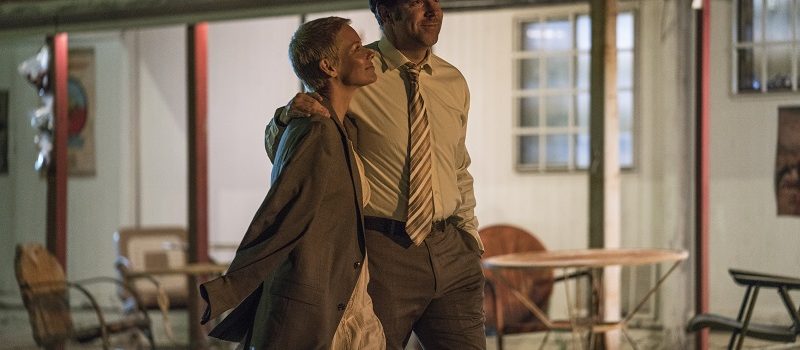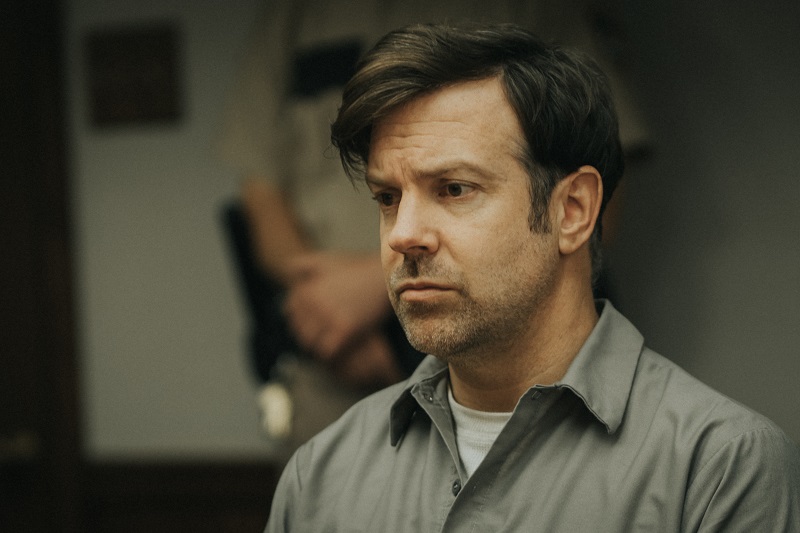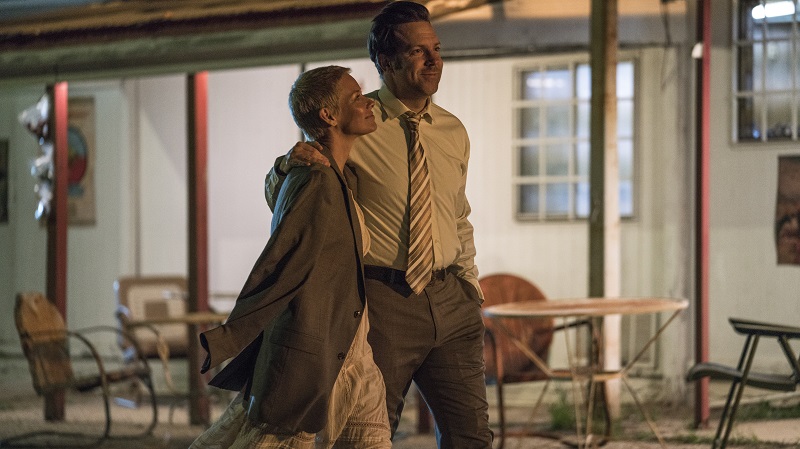If it seems like Jason Sudeikis is everywhere lately, that is because he is and for longtime fans like this guy, that is just fine. After scoring an Emmy win for Best Actor in a Comedy for his transcendent work as Coach Ted Lasso and being the co-creator and producer (as well as star) behind the show that everybody is talking about, the actor changes things up. His role in South of Heaven will surprise many, but for those of us who have followed his career since the beginning—nothing is surprising. This is a guy who can do anything.
In South of Heaven, he is an ex-con who as the film commences is just getting out of jail after a 12-year stint for armed robbery. He is excited to go home to his beloved Annie (Evangeline Lilly), who has been given one year to live, thanks to that evil entity that is cancer. Sudeikis’ Jimmy has one mission, and it was one that moved the parole board to grant his early release from prison to do just that—provide Annie with the best year of her life, depending on what she deems is “best.”
Like any drama worth its weight, it’s not that easy and as the film progresses and she inches closer to the inevitable, Jimmy feels helpless—for one—and clueless as to how to help. Over the course of the story from writer-director Aharon Keshales (Big Bad Wolves), there is much to learn about life, death, and everything in between.
Keshales shows great promise as an auteur. After making a career as a writer, then writer-director, much of his resume is filled with horror or vengeance flicks. This is a bit of a departure for the storyteller, and it shows some serious range and potential. It may seem like the simplest of premises, but because of many issues that this couple faces, South of Heaven plays like a character study of two souls that every single one of us will find something that connects us to them. That is no easy task.
There’s an approachability to Keshales’ latest that hasn’t been the main focus of his previous work. Although most of us, thankfully, aren’t ex-cons, the writer has crafted two characters in Jimmy and Annie that either has traits that we can connect to or find themselves in situations that mirror our own. The struggle may be different, but the emotive rollercoaster Jimmy and Annie experience over the course of the film is congruent.
Now, there’s an entire storyline involving a corrupt parole officer and demands he makes on Jimmy. That may add “tension” to the overall story, but here it serves as a bit of a distraction. There are other means with which to illustrate how far Jimmy has come than to have him be challenged by the very court-ordered individual who is supposed to steer you away from trouble.
Lilly is a fascinating actress. We were first introduced to her talents in Lost and as a longtime Marvel movie appreciator, hearing her being cast in Ant-Man was bloody brilliant. This film highlights another side of the thespian that must have been incredibly challenging to undertake. To do justice to the countless folks who have had or have terminal cancer or another life-taking ailment where they find life could become like a countdown—if you let it—had to drive her to dig deeper.
As such, her Annie isn’t some wallflower who has waited for her man to get out of prison. She is someone who has done everything she can to extend her life and to make her quality of life in the meantime as positive and enjoyable as it can be.
She captures the spirit of such a soul with an incredible amount of tenderness, coupled with a command of her tragic truth that is electrically refreshing. Sometimes, she even has to be the one to play reality check to the dreamer that is Sudeikis’ Jimmy. It’s a fascinating pairing to witness and collectively the actors deliver in the most endearing of manners.
Sudeikis too dug deep and as such, showed the world that he is merely scratching the surface of what he is capable of as an actor. No, this is not some Oscar-bait role, but the thing is—Sudeikis treated as such. He encapsulates the strong partner of an ill individual, who he himself fluctuates from utter sadness that this is occurring to all-out anger that this is… occurring. It is the most challenging of needles to thread for dramatic actors with decades of experience in that realm, much less someone who is more known for making us laugh and not making us think and yes, cry.
The Ted Lasso star, by the end of the film, is someone you just want to dive into the picture and give him the biggest hug. That, right there, is the definition of the highest of praise given the story and particularly, his character’s flawed and violent background. In the hands of Sudeikis, his Jimmy is relatable, welcoming, and primarily—embodies someone we all aspire to become should we sadly wind up in a comparable situation. He is strong for Annie, while at the same time dealing with his approaching mourning that is a question of when not if. That quandary of being there for someone and also for oneself is an aspect of South of Heaven that might be the film’s biggest accomplishment.
It’s a message that should resonate with every person who witnesses it. That may be Keshales’ greatest achievement as a storyteller. When sitting down to pen this story, what was he thinking? Let’s create a tale about a couple where one of them is going to die in a year. In terms of creating an emotional connection from the viewer, the idea practically writes itself. But you know what? Let’s have one of those characters be an ex-con who just got out of prison. Keshales smartly did just that to make a powerful point. At the end of each day, no matter where we hang our head—whether it is a mansion, a rundown farmhouse, or the inside of a prison—our emotive spectrum is the same. Grappling with enormous life roadblocks happens to everyone and it is how we deal with those that define us—regardless of our lot in life.
That is one message that is impossible to ignore.
Grade: B+




